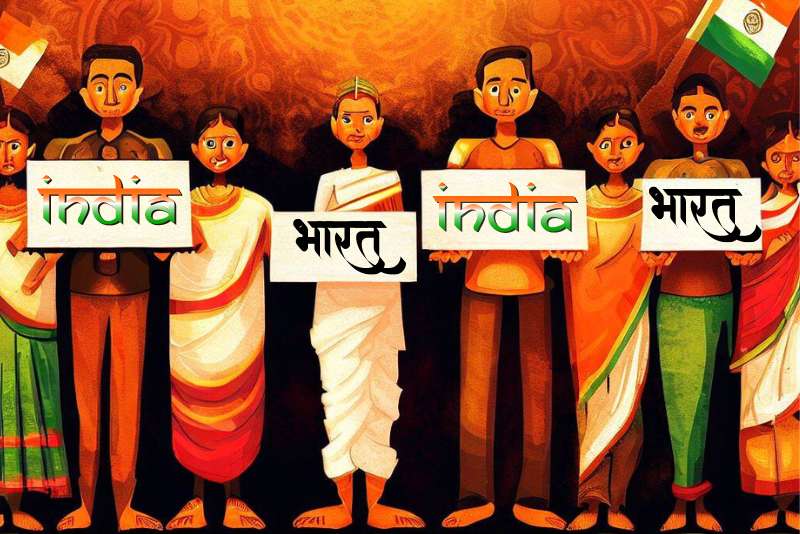
Origins of the Debate: India or Bharat?
The discussion surrounding the official name of the Republic of India has resurfaced, triggering widespread discourse and reflection on the nation’s identity. This resurgence in the debate was sparked by the President of India’s use of the term ‘Bharat’ on an invitation card for G20 delegates, igniting discussions not only on social media but also within intellectual circles.
The Presidential Invitation: A Catalyst for Debate
Historically, high offices in India, such as the President, Prime Minister, and Chief Justice, have adhered to titles like President of India while communicating in English. However, in recent years, India’s ruling Bharatiya Janata Party (BJP) government has been advocating for changes to colonial-era names, asserting that it’s a step toward shedding the vestiges of British colonialism.
Opposition leaders have criticized the name change, viewing it as an attempt to eclipse their own political alliance, named “INDIA,” which stands for Indian National Developmental Inclusive Alliance. Mamata Banerjee, a prominent opposition leader, questioned the sudden push for a name change and emphasized the global recognition associated with ‘India.’
Shashi Tharoor, a member of the opposition Congress party, expressed concerns about discarding the name ‘India,’ which has garnered immense brand value over centuries. The change to “President of Bharat” comes in the wake of the formation of the “INDIA” alliance by opposition parties to challenge the BJP in the upcoming national elections.
Political analysts view this as a strategic move to counter the BJP’s nationalist platform. India’s presidency is largely ceremonial, with the President traditionally backed by the ruling party. The official response from the President’s office on this matter remains undisclosed.
A Historical Perspective
To grasp the depth of this debate, it is essential to explore the historical roots of India’s various names. ‘India’ traces its origins to ‘Indus,’ a reference to the Indus Valley civilization, one of the earliest in human history. Conversely, ‘Bharat’ finds its roots in Sanskrit, associated with the legendary king, Bharata, who unified the subcontinent according to ancient Indian scriptures. ‘Hindustan,’ rooted in Persian, was employed by Mughal rulers to describe their dominion as the “land of Hindus.”
The transition from ‘Bharat’ or ‘Hindustan’ to ‘India’ can be seen as a consequence of the country’s colonization, an attempt to impose foreign nomenclature on an ancient civilization. Some argue that the British colonial rulers opted for ‘India’ due to their inability to pronounce ‘Bharat’ or ‘Hindustan.’
The Significance of a Name
A nation’s name goes beyond mere semantics; it signifies identity, history, and cultural heritage. The debate over ‘India,’ ‘Bharat,’ or ‘Hindustan’ delves deep into India’s historical narratives and cultural semantics. It seeks to redefine and reaffirm the nation’s cultural heritage while disputing the colonial history.
Why Would a Country Change its Name: A Global Perspective
The act of changing a country’s name is a potent symbol of political dynamics, influenced by ideology shifts, decolonization, political upheavals, or a desire to challenge the old system. Globally, numerous nations have undergone such transitions. For instance, Zaire became the Republic of the Congo, and Ceylon transformed into Sri Lanka.
Renaming reflects power dynamics, decolonization, or a reclaiming of cultural roots. It may result from colonial influences, political shifts, or a desire to better represent cultural heritage. The change in a country’s name can also be a political tool to reshape its global image, as seen when Burma became Myanmar.
The Value of a Name: India or Bharat or Hindustan?
A nation’s name encapsulates its identity, history, and cultural values. ‘India’ connects to its early civilization and colonial history. ‘Bharat’ reflects indigenous culture and mythologies. ‘Hindustan’ symbolizes a diverse confluence of cultures and religions under the Mughal Empire.
Each name holds unique value and represents different facets of India’s identity. Instead of a binary choice, the debate should acknowledge the richness of India’s cultural and historical panorama.
The Broader Picture: Beyond the Debate Over a Name
While the debate over India’s name is significant, it must not overshadow broader issues. A nation’s name is a symbol, but its essence lies in its people, shared histories, and values. India’s diverse population demands unity, inclusivity, and mutual respect.
National priorities such as economic stability, social justice, and international relations require attention. Embracing multiple names, like ‘India,’ ‘Bharat,’ or ‘Hindustan,’ aligns with India’s ‘Unity in Diversity’ principle.
In summary, the proposal to rename India is laden with symbolism, reflecting a desire to assert indigenous identity and historicity. However, it also raises questions about national priorities and inclusivity. Beyond the name, India’s path forward lies in shaping its global image, fostering unity, and addressing pressing socio-economic issues.
You may also read: FIR Filed Against Editors’ Guild of India Team Over Manipur Violence Report
Gangtokian Web Team, 06/09/23
















































